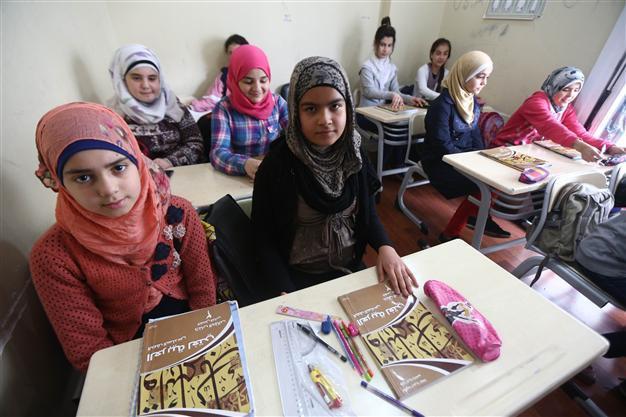Turkey calls for help to prevent 900,000 Syrian children from becoming ‘lost generation’
Sevil Erkuş - ANKARA

Girls attend a class in a Syrian private school in Mersin, southern Turkey on March 12, 2015 where at least 200.000 Syrians live after feeing the war in their country. AFP Photo
The Turkish Disaster and Emergency Management Presidency (AFAD) has called for support for Child Friendly Spaces (CFS), part of a project which aimed to prevent more than 900,000 Syrian children in Turkey from becoming a “lost generation,” with efforts to provide them with access to quality education, a safe environment and a return of normalcy to their lives.Launched in March 2013, the project aimed to increase the resilience of more than 900,000 Syrian children out of the 1.7 million Syrians living in Turkey.
The project included the setting up of CFS, temporary education centers and libraries, the provision of psychosocial support to children and youth, the establishment of a financial incentive system for Syrian teachers and leadership training for adolescents as the key achievements of this partnership.
“One generation is being wasted away,” AFAD Response Department head Fatih Özer said while speaking at the ceremony for the closure of the project on April 15.
Özer said he personally directs many proposals of funds towards education projects, rather than projects for food, stressing the need to continue such projects. He called on international actors for further help to support the continuation of the project.
Özer said he had many discussions with UNICEF officials about spending more funds on education rather than CFS, but later realized how necessary providing children a safe environment for psychosocial support was.
CFS play a vital role in helping children cope with the horrendous events they have been exposed to during the Syrian civil war, according to Mehmet Dolgun, one of the Kızılay children and youth officers serving at the Nizip refugee camp in the southern province of Gaziantep.
“They are traumatized by war. They are afraid, hopeless and feeling worthless. We are working to resolve their traumas. They were initially apprehensive and having difficulties being social,” Dolgun said, noting his pleasure when seeing those children getting better day-by-day.
Over 75,000 Syrian children benefited from the two-year “Increasing Resilience of Syrian Children under Temporary Protection in Turkey” project in Turkey, implemented in partnership between UNICEF, the AFAD, the Ministry of National Education and the Turkish Red Crescent, with the financial support of the European Union.
Some 900 Syrian youth volunteers were trained and have been leading activities. More than 6,500 Syrian teachers were trained and have been working as volunteers in schools established in refugee camps and other locations. Nearly 3,000 Syrian teachers were benefiting from financial incentives. Libraries were established in 21 camps.
















